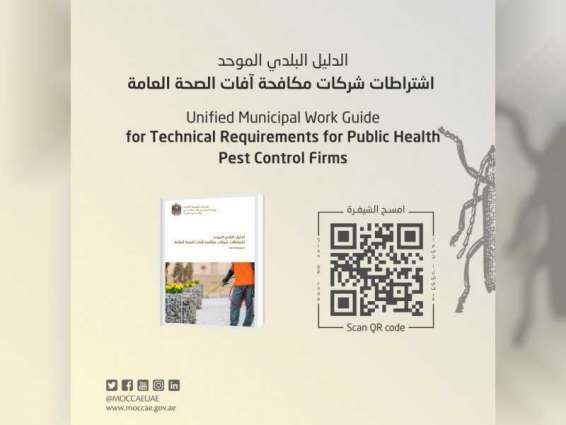DUBAI, (Pakistan Point News - 23rd Feb, 2021) The Ministry of Climate Change and Environment (MoCCAE) has released the Unified Municipal Work Guide for Technical Requirements for Public Health Pest Control Firms which establishes a Federal framework for regulating pesticide use and trade as well as pest control activities.
The publication covers five main sections: technical requirements for pest control firms, categories of pest control activities, types of pest control firms, public health pests, and monitoring and inspections.
Saif Al Shara, Assistant Under-Secretary for the Sustainable Communities Sector and Acting Assistant Under-Secretary for the food Diversity Sector at MoCCAE, said, "Protecting public health through combating pests and regulating the use of chemicals is a priority for MoCCAE. The ministry developed the guide in cooperation with the concerned local authorities to provide detailed guidelines for firms working in the field."
The section on technical requirements for pest control firms highlights the prerequisites for licencing new companies and renewing licences for existing ones, such as obtaining a commercial permit from the Department of Economic Development and submitting a list of technical personnel. It also specifies the training and permits that the technical personnel must have to practice this activity, guidelines on the chemicals used by the firms, pesticide storage and transport conditions, and the proper ways to manage and dispose of waste generated from pest control, such as empty pesticide containers, sprayers, and pesticide leftovers.
Pest control and related activities are divided into three groups: control of rodents, flies, mosquitos, cockroaches, bed bugs, fleas, ticks, bees, spiders, snakes, and scorpions, control of termites underground and in dry and wet wood, and control of storage pests using fumigation.
Meanwhile, the section on classifying pest control firms defines the criteria used in determining the types of firms that are evaluated through regular inspections to ensure the companies’ compliance with the technical requirements.
In the section on public health pests, they are divided into distinct groups that include insects, arthropods, reptiles, birds, and stray animals, in addition to identifying effective control methods for each group.
The section on monitoring and inspections stipulates that pest control firms wishing to advertise certain types of pesticides must adhere to Cabinet Resolution No.16 of 2019 on the system for advertising pesticides. It also outlines the standard procedures and frequency of inspections. An administrative and technical inspection must be carried out whenever the firm registers a new activity or renews the license. Meanwhile, periodic site (office or warehouse) inspections must take place at least quarterly, whether with or without notice.
Violations include displaying, selling, or using expired, unregistered, or banned pesticides, failing to store pesticides in separate locations, absence of valid work permits, hiring unlicensed personnel, failing to use personal protective equipment (PPE), unsanitary or contaminated work environment, and improper waste disposal.
The guide comprises an appendix on the specifications of pesticide containers and their labelling. It states that containers must be double-walled to prevent moisture intrusion, breakage, or damage. They must not contain substances that could react with the contents and form other compounds or weaken structural integrity. They must not be made of glass or other non-opaque material and must withstand the anticipated handling, storage, stacking, loading, and unloading.




